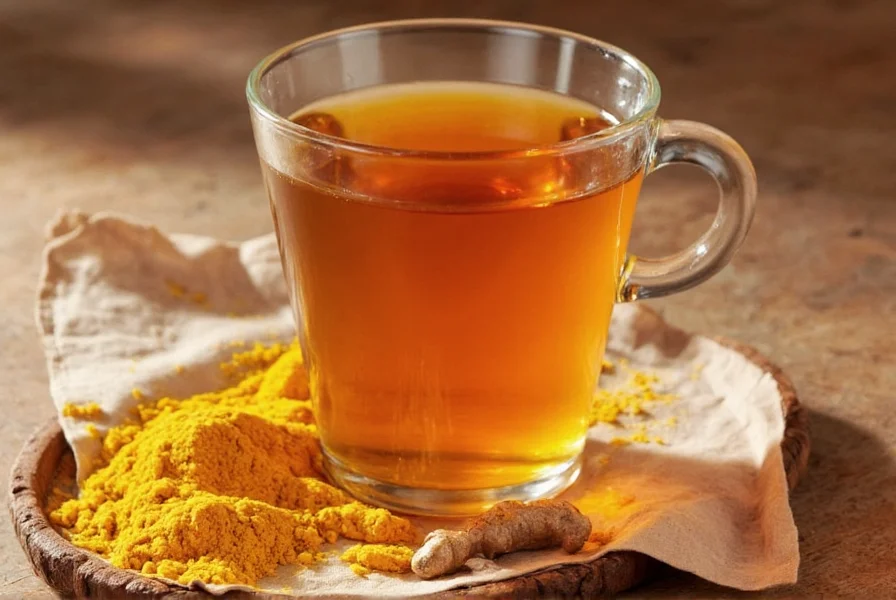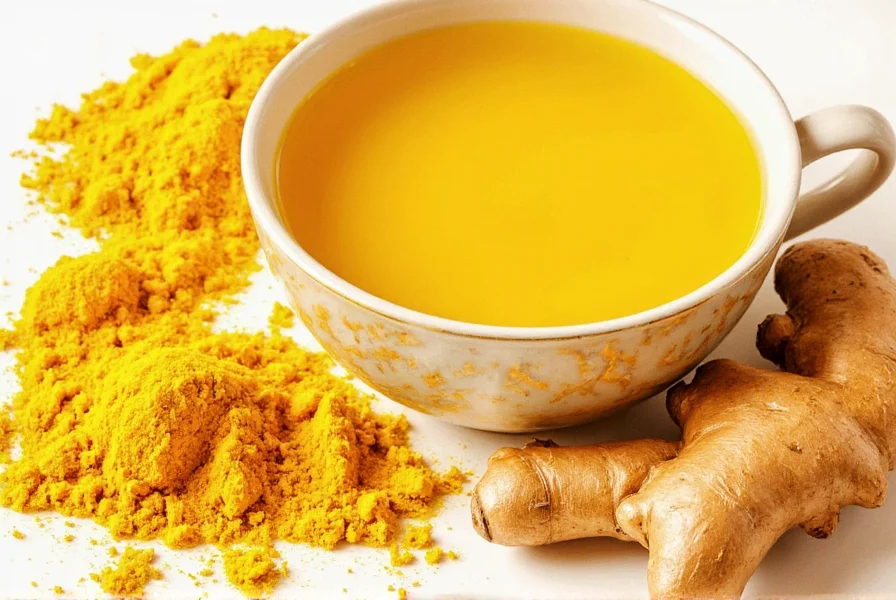Ginger and turmeric tea has surged in popularity as a natural wellness beverage, combining two powerful roots with centuries of traditional medicinal use. This vibrant golden drink offers more than just comforting warmth—it delivers a synergistic blend of bioactive compounds that modern science continues to investigate for their potential health applications.
The Science Behind Ginger and Turmeric Tea Benefits
Research indicates that the combination of ginger (Zingiber officinale) and turmeric (Curcuma longa) creates a powerful synergy. Turmeric contains curcumin, which comprises about 2-8% of the root and demonstrates significant anti-inflammatory effects. Ginger's primary active compound, gingerol, works through different pathways to reduce inflammation. A 2021 review in Nutrients highlighted that combining these spices may enhance bioavailability and effectiveness compared to consuming them separately.
Unlike many trending wellness beverages, ginger turmeric tea has substantial scientific backing. Clinical studies have examined its effects on:
- Osteoarthritis pain reduction (multiple randomized controlled trials)
- Digestive health improvement, particularly for nausea and indigestion
- Exercise-induced muscle soreness mitigation
- Metabolic health markers in preliminary studies
However, it's crucial to understand that while promising, most research examines concentrated extracts rather than tea preparations. The actual concentration in homemade tea varies significantly based on preparation methods.
How to Prepare Optimal Ginger Turmeric Tea at Home
Creating therapeutic-grade ginger turmeric tea requires attention to preparation details that maximize bioactive compound extraction:
| Ingredient | Recommended Amount | Preparation Tip |
|---|---|---|
| Fresh turmeric root | 1-2 inches | Peel and slice thinly for maximum surface area |
| Fresh ginger root | 1-2 inches | Crush slightly to release oils |
| Water | 2-3 cups | Bring to boil, then simmer |
| Black pepper | 1/8 teaspoon | Essential for curcumin absorption |
| Healthy fat | 1 teaspoon coconut oil | Curcumin is fat-soluble |
For maximum benefit, simmer sliced roots in water for 15-20 minutes (not just steeping), then add black pepper and a healthy fat source. The curcumin in turmeric has poor bioavailability on its own—adding black pepper increases absorption by up to 2,000% according to research published in Planta Medica.

Understanding Potential Side Effects and Considerations
While generally safe for most people, ginger and turmeric tea side effects warrant consideration:
- Blood thinning effects: Both spices have mild anticoagulant properties. Those taking blood thinners should consult their physician.
- Gastrointestinal sensitivity: High concentrations may cause heartburn or stomach upset in sensitive individuals.
- Gallbladder concerns: Turmeric may stimulate bile production, problematic for those with gallstones.
- Drug interactions: May interact with diabetes medications and certain chemotherapy drugs.
The appropriate daily consumption of ginger turmeric tea varies by individual. Most studies use standardized extracts equivalent to 1-3 cups of strongly brewed tea daily. It's advisable to start with smaller amounts to assess tolerance.
Ginger Turmeric Tea Versus Other Wellness Beverages
How does this golden tea compare to other popular wellness beverages? Unlike many trendy "miracle" drinks, ginger turmeric tea has more substantial research backing, though it's not without limitations:
- Compared to green tea: Offers different antioxidant profiles—green tea provides catechins while ginger turmeric delivers curcuminoids and gingerols.
- Compared to matcha: Lacks caffeine but provides different anti-inflammatory mechanisms.
- Compared to plain ginger tea: Adds turmeric's curcumin for enhanced anti-inflammatory effects.
- Compared to store-bought "detox" teas: Contains actual researched ingredients rather than marketing-driven blends.
The natural remedies with ginger and turmeric stand out for their evidence-based benefits, but they work best as part of a comprehensive wellness approach rather than standalone solutions.
Practical Integration Into Daily Wellness Routine
For those interested in incorporating ginger turmeric tea into their routine, consider these evidence-based approaches:
- Morning preparation: Brew a strong batch and store in glass container for up to 48 hours
- Post-workout consumption: May help reduce exercise-induced inflammation
- With meals: Enhances digestion and nutrient absorption
- Cold season support: Part of a comprehensive immune support strategy
Remember that consistent, moderate consumption yields better results than occasional large doses. The scientific evidence for turmeric ginger tea suggests benefits accumulate over time with regular use.

Conclusion: Realistic Expectations for Ginger Turmeric Tea Benefits
Ginger and turmeric tea represents a valuable addition to a health-conscious lifestyle, supported by growing scientific interest in its bioactive compounds. While not a cure-all, its anti-inflammatory properties and digestive benefits make it a worthwhile beverage choice. The health benefits of ginger and turmeric tea are most pronounced when prepared correctly and consumed consistently as part of an overall wellness strategy. Always consult with healthcare providers about incorporating new elements into your health regimen, especially if managing chronic conditions or taking medications.
Frequently Asked Questions
How often should I drink ginger turmeric tea for optimal benefits?
Most research suggests 1-3 cups daily provides optimal benefits without risk of side effects for most people. Start with one cup daily to assess tolerance, then gradually increase. The ideal frequency depends on individual health status and goals—those seeking anti-inflammatory effects may benefit from twice-daily consumption, while others might prefer it as a morning digestive aid. Always consult your healthcare provider if you have specific health conditions.
Can ginger turmeric tea help with weight loss?
Ginger turmeric tea may support weight management as part of a comprehensive approach but isn't a standalone solution. Research indicates it may modestly boost metabolism and reduce inflammation associated with obesity. A 2019 study in Nutrition Journal found that curcumin supplementation helped reduce body fat percentage when combined with diet and exercise. The tea itself has minimal calories and may help with appetite regulation, but significant weight loss requires dietary changes and physical activity.
When is the best time to drink ginger turmeric tea?
The optimal timing depends on your goals. For digestive support, consume 20-30 minutes before meals. For anti-inflammatory benefits, many find morning and evening consumption effective. Those using it for nausea relief should drink it when symptoms appear. Avoid late evening consumption if you're sensitive to ginger's mild stimulating effects. Adding it to your morning routine provides antioxidant protection throughout the day, while evening consumption may support overnight recovery processes.
How long does it take to notice benefits from ginger turmeric tea?
Noticeable effects vary by individual and health goal. Digestive benefits may appear within days, while anti-inflammatory effects typically require 4-8 weeks of consistent daily consumption. Research on curcumin's effects generally measures outcomes after 6-12 weeks. The bioactive compounds accumulate in the system over time, so regular consumption is key. Some people report increased energy and reduced joint stiffness within the first two weeks, but significant changes in chronic inflammation markers take longer to manifest.











 浙公网安备
33010002000092号
浙公网安备
33010002000092号 浙B2-20120091-4
浙B2-20120091-4